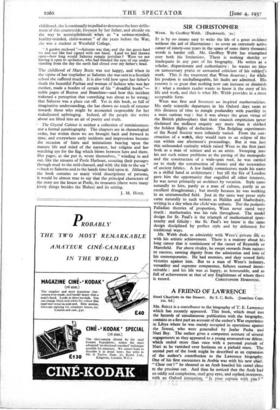SIR CHRISTOPHER
Wren. By Geoffrey Webb. (Duckivorth. -2s.) IT is by no means easy to write the life of a great architect without the aid of illustrations : to cover an extremely active career of ninety-one years in the space of some thirty thousand words is harder still. Mr. Geoffrey Webb has triumphed over both his limitations. There is nothing sketchy or inadequate in any part of his biography. He writes as a scholar, dispassionate and authoritative : he wastes no time on unnecessary praise or unwanted criticism of his subjFct's work. This is the treatment that Wren deserves ; for while his position is unchallengeable, his faults are admitted. His renown is so great that nothing now can increase or diminish it : what a modern reader wants to know is the story of his life and work, and that is what Mr. Webb provides in a most acceptable form.
Wren was first and foremost an inspired mathematician. His early scientific departures in his Oxford days seem at this distance of time to mingle profundity with puerility in a most curious way : but it was always the great virtue of the British philosophers that their staunch empiricism never disdained the melnest enquiry any more than it shirked the boldest flights of deduction. The fledgling experiments of the Royal Society were infinitely varied. From the con- struction of a watch, they would turn to an eclipse of the sun within one afternoon's proceedings. But it was just this unbounded curiosity which raised Wren to the first rank both as a man of science and as an artist. Sweeping into his net such minor problems as the paving of the metropolis and the construction of a wide-span roof, he was carried on to study the construction of domes and the restoration of ancient fabrics. A few family commissions made his name as a skilful hand at architecture : but till the fire of London gave him the opportunity that engulfed all other interests, he was never primarily an architect by vocation. Style came naturally to him, partly as a man of culture, partly as an excellent draughtsman ; but mostly because he was working in an untrammelled field. Just in the same way prose style came naturally to such writers as Halifax and Shaftesbury, writing in a day when the cliché was unborn. For the pedantic Palladian theories of proportion, Wren never cared very much : mathematics was his rule throughout. The model design for St. Paul's is the triumph of mathematical spon- taneity and felicity : the St. Paul's we know is the same design disciplined by perfect style and by deference for traditional ways.
Mr. Webb deals as admirably with Wren's private life as with his artistic achievement. There is a majesty about his long career that is reminiscent of the career of Reynolds or Mansfield. Far above rivalry, he swept onwards from success to success, earning dignity from the admiration and love of his contemporaries. He had enemies, and they scored little victories against him. But to a man of Wren's industry, versatility and supreme competence, failures seemed incon- ceivable : and his life was as happy, as honourable, and as full of achievement as that of any Englishman of whom there










































 Previous page
Previous page